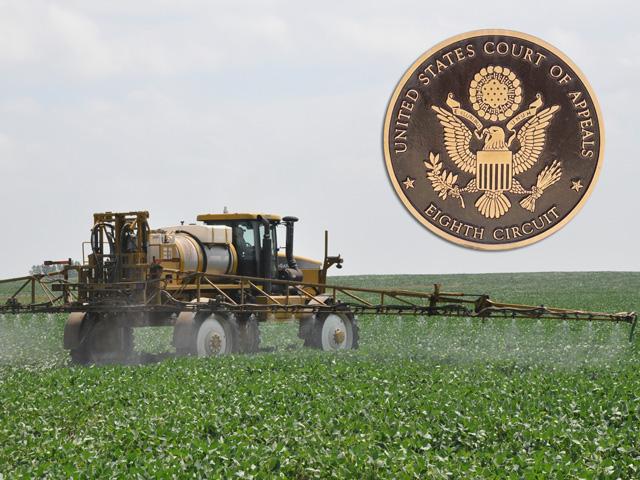Ag Makes Case for Chlorpyrifos in 8th
Aggies Ask Eighth Circuit to Force EPA to Make Chlorpyrifos Available to Farmers
LINCOLN, Neb. (DTN) -- Though EPA had a written commitment from Gharda Chemicals International Inc. to continue selling the insecticide chlorpyrifos under certain safety conditions already found by the agency to be supported by science, the EPA revoked all tolerances of the chemical.
"Now, as a matter of law, EPA does not need the cooperation of any registrant in order to make a tolerance decision," Nash E. Long, attorney for ag groups and the chemical company, said during oral arguments before the U.S. Court of Appeals for the Eighth Circuit in St. Louis, Missouri, on Thursday.
"It can make the tolerance decision on its own on the basis of the information that it has. It does not need any cooperation from Gharda or any other registrant to do that. But in fact, what they did get, and it's in the record, is the written commitment from Gharda to change its registrations to comply with the agreed-upon list of safe uses. They had that commitment in writing, and what did they do? They just went silent over the last few weeks of the deadline period and walked away. There was nothing that forced this decision out of EPA; they had the information that is the scientific safety finding."
EPA finalized a rule on Feb. 28, 2022, revoking the food tolerances for chlorpyrifos, effectively banning legal use of the insecticide among U.S. farmers. That rule was issued by the Biden EPA in August 2021 in response to an order from the U.S. Court of Appeals for the Ninth Circuit.
The EPA issued a new interim registration for the insecticide in December 2020 before the Ninth Circuit handed down its order in April 2021. That order led EPA to issue its food tolerance revocation.
In the December 2020 action by EPA, it found 11 high-benefit, low-risk crop uses for chlorpyrifos.
All other chlorpyrifos registrants have since pulled their registrations.
EPA has maintained that because it was given just 60 days by the Ninth Circuit to act, the agency had to cancel all chlorpyrifos tolerances.
P[L1] D[0x0] M[300x250] OOP[F] ADUNIT[] T[]
"I think the question for the court is whether EPA's decision was reasonable at the time it was made," Laura Glickman, Department of Justice attorney, said during oral arguments.
"I think it is true that normally their practice is to try to negotiate changes with registrants. And I think the record here shows that EPA really bent over backwards to try to maintain some uses."
Long said the interim decision issued by EPA in 2020 to re-register chlorpyrifos addressed safety issues based on available data at the time.
"It was certainly more than just a proposal," Long told the court.
"It was an announcement of the results of safety analysis that had been completed earlier. And it used very specific language saying, 'We have determined that the safe uses will not pose potential risks.' That finding then went through notice and comment. Even after that in the August 2021 rule, EPA said that the safe uses were indeed safe. This suggestion that my colleague has made that there's some doubt about the science here is just not true."
The court asked Long whether it was feasible to deny the ag groups' petition, meaning Gharda would then have to formally cancel its chlorpyrifos registration and file an administrative petition to reinstate tolerances.
"The problem with that, your honor, is that for the registrants, the manufacturers, it takes years and hundreds of thousands of dollars to do," Long said.
"But more critically for the other petitioners here, the growers, that gives them no relief in the interim, and the pest pressure grows every year that the pests are untreated. Those losses will continue to bind clients. They will get worse over time."
Long asked the court to vacate EPA's decision to revoke chlorpyrifos tolerances and send it back to the agency to enter a safety finding for the safe uses the EPA already identified.
Gharda was joined in the Eighth Circuit lawsuit by Red River Valley Sugarbeet Growers Association, U.S. Beet Sugar Association, American Sugarbeet Growers Association, Southern Minnesota Beet Sugar Cooperative, American Crystal Sugar Company, Minn-Dak Farmers Cooperative, American Farm Bureau Federation, American Soybean Association, Iowa Soybean Association, Minnesota Soybean Growers Association, Missouri Soybean Association, Nebraska Soybean Association, South Dakota Soybean Association, North Dakota Soybean Growers Association, National Association of Wheat Growers, Cherry Marketing Institute, Florida Fruit and Vegetable Association, Georgia Fruit and Vegetable Growers Association, and National Cotton Council of America.
Read more on DTN:
"EPA Sued Over Chlorpyrifos Ban," https://www.dtnpf.com/…
"Chlorpyrifos Ban Stands," https://www.dtnpf.com/…
"EPA Advances Chlorpyrifos Ban," https://www.dtnpf.com/…
Todd Neeley can be reached at todd.neeley@dtn.com
Follow him on Twitter @DTNeeley
(c) Copyright 2022 DTN, LLC. All rights reserved.






